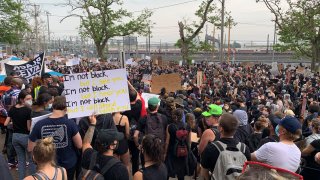
When thousands marched through New Haven this summer in protest of the death of George Floyd and others who died in police custody, they were led by young people.
NBC Connecticut spoke with Juan Patterson and Remidy Shareef of New Haven’s Ice the Beef to discuss what they see for the next generation of social justice advocates.
“It’s the group of people that make the difference,” said Patterson. “Instead of, you know, pointing out the problem, what are we going to do about the problem.”
Ice the Beef offers young people in New Haven programs and actives of their interest. Patterson started as a rapper and got involved in debate, public speaking and advocacy. He was once the Youth Lt. Governor of the state and is now interested in studying political science.
Shareef is the outreach director for Ice the Beef and says their work helps show young people the power of activism.
“We are helping our youth understand the political system, how it works and where we can gain from it,” said Shareef. He said it helps them learn they have a voice in the system, and they can hold elected officials accountable.
They both went to Georgia and helped spread that message during the last election.
Local
“Us going down to Georgia and seeing how many people were inspired to vote and how many new voters there were in Georgia, I’d say the needle definitely moved,” said Patterson.
He said it was surreal to be part of history turning Georgia blue. They compare this social justice moment to Dr. Martin Luther King Jr. and the Civil Rights Movement. Among the efforts decades ago was the right to vote.
“When I think of his work, it propels me to do more. I understand fully that we are and have been standing on the shoulders of greatness,” said Shareef.
They say they are empowered by the past.
“We compared it to us, and we thought, you know, in this generation it’s unusual and we’re surprised to see that teens were fighting, and we’re proud of it, but it was happening in Birmingham when they were also fighting for racial equality. I think this is the same fight,” said Patterson.
It’s a movement that keeps repeating itself, said Lorenzo Boyd, vice president of diversity and inclusion at the University of New Haven.
“A lot of our parents or grandparents that went through the civil rights struggles of the 60s, we see a lot of people going through these same marches and same protests now,” said Boyd.
He said there’s a sentiment to begin healing across the country, but there’s work to be done.
“For generations, black and brown people have been pained by the criminal justice system, by the legal system, by the political system. We need to acknowledge the pain and right those wrongs, and then we can actually move forward together,” said Boyd.
For Patterson and Shareef, they said Dr. Martin Luther King Jr. Day is about reflecting on the past and organizing for the future.
“This is something we carry with us 365 days,” said Shareef, saying there is a continual struggle against injustices for people of color. “It means that we have to keep fighting for our survival, fighting for human dignity and human respect for all people.”
Patterson agrees, thinking about those who lead the Civil Rights Movement.
“It’s never-ending. it’s a never-ending fight and I think we’re very alike, we’re just in different generations.”



